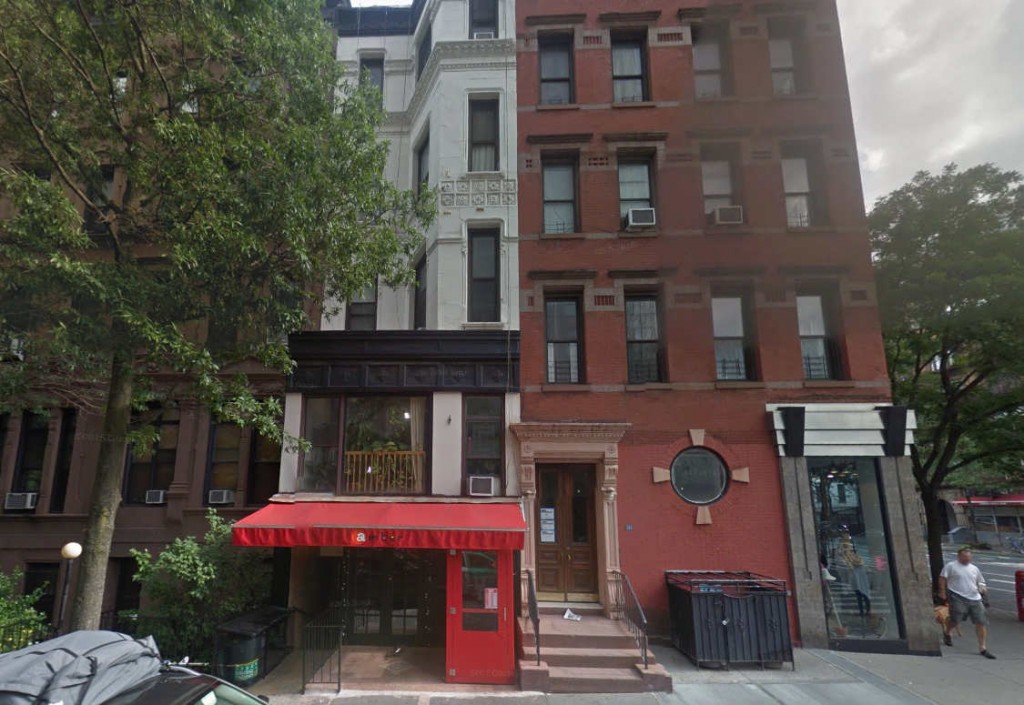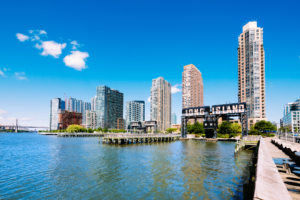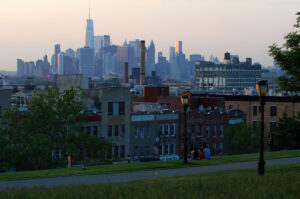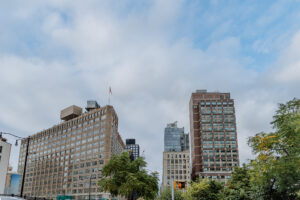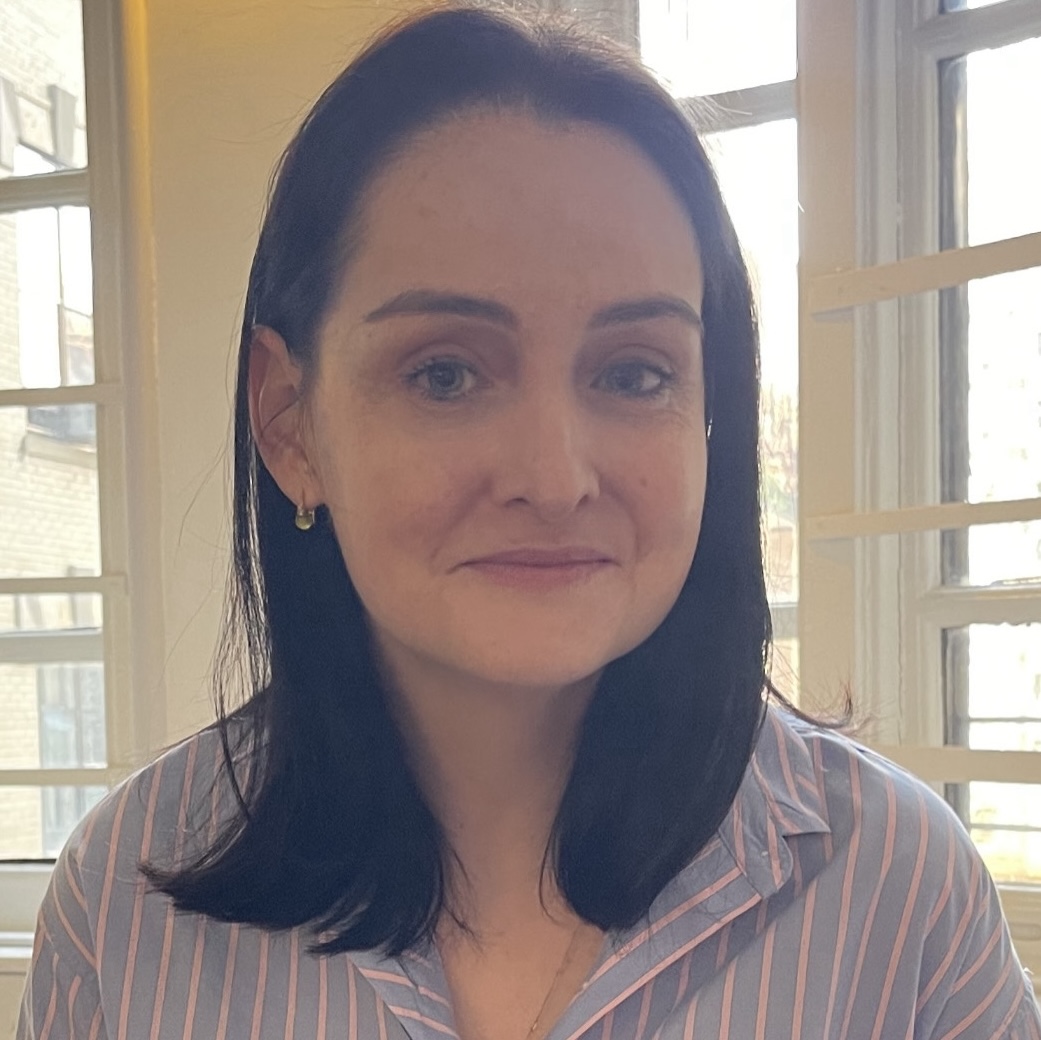You want to try living in a 90-square-foot apartment? Let Felice Cohen be your guide. The author and professional organizer has penned a new e-book called “90 Lessons for Living Large in 90 Square Feet (… or more).” It’s based on her five-year experience living in a tiny, but well-organized Upper West Side studio.
She lived at 103 W. 70th Street in a studio paying $700 in rent. That same studio is now $1,495 a month — and pets are welcome!

Felice Cohen
A YouTube video of Cohen’s experience has already garnered more than 10 million views. The video shines light into the unique pad where she lived without a real kitchen and or dining table, but still managed a full and productive life.
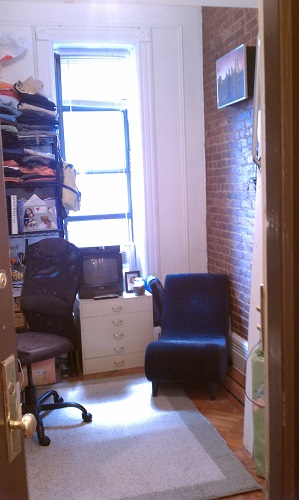
She has since moved on to a new apartment, purchasing a “massive” 490-square-foot UWS co-op for under $300,000 two years ago.
“Once I knew I had to move, I looked on StreetEasy for rentals. But then, after speaking with my grandfather, a Holocaust survivor, he told me to ‘buy a place already.’ I went back to StreetEasy and found a number of places in my price range. The very first one I looked at I fell in love with,’’ Cohen said, adding: “I called to look at it. There I met the broker handling the sale. She represented the seller, but did work to help me buy. (I did look at a few others: Friends begged me not to take the first place I saw.) Two months later I moved in. It was that simple.’’
We talked to Felice, who generously shared her pioneering views on one inventive way to make it work in the space-challenging world of New York City apartments.
What led you to the 90-square-foot apartment?
I didn’t set out to live in a tiny space. I was living in the Bronx and wanted to try Manhattan, just for a year. I wanted the UWS, but it was expensive, so I looked on the UES. Then a friend said a friend of hers was looking to sublet her place on the UWS, but warned it was small. When I first saw the 90-sq-foot space it was crammed with stuff, but as a professional organizer, I knew I could make it work.
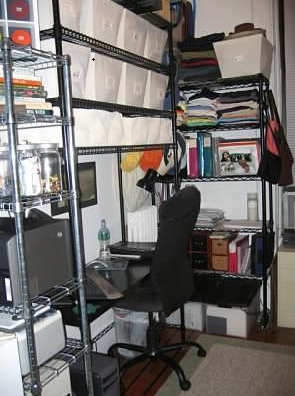
Her “work area”
How many apartments in NYC did you live in or look at before making this decision?
I looked at a handful of studios on the UES (At the time I was working at Hunter College as the Chief of Staff to the president), but I didn’t like any of them. They were just plain boxes, with bad views and no charm.
Did you have roommates before and decide ‘Never Again?’
I had been living with my uncle, Mark — who was like my big brother; he died this past December unexpectedly from leukemia and I dedicated my new book to him — in his spacious Bronx apartment for a number of years. It was Mark who said to me on New Year’s Eve in 1996 that “it was time we lived on our own.” It was the push that I needed.
How much time did you spend out of your apartment?
As much as the average person I would say. I didn’t leave the space because it was small. I went out if I were going to my organizing clients, the gym, bike ride, Paragraph (my writing studio downtown), errands, to see friends, travel. But I worked from home a lot, too. Here is how I saw the tiny space: When I was getting dressed, the entire apartment was like a “fitting room.” When I was working, it was like a studio.
What was the most elaborate social event you ever tried to pull off in your space?
Brunch. My family was visiting from Cape Cod and I suggested we eat at my place, just bagels and fruit. Myself, my parents, one sister, brother-in-law, niece (4) and nephew, who was an infant. The stroller’s seat popped out and they carried him up. Once upstairs, we put him and the seat into the tub. It was a little cramped, but we laughed as we compared it to clowns coming out of a Volkswagen Beetle.
Did you secretly wish you had never taken on this mission?
Only once. The first night I slept in the loft bed. I woke in the middle of the night drenched in sweat. I felt trapped by the ceiling, walls and a friend I invited to sleepover in case I fell out. My real concern was that I wouldn’t be able to get out fast enough in an emergency. Once I calmed down, my friend suggested I install a hook and a handle on the ladder, which I did, and after that, never had a problem again. The loft bed became my safe haven.
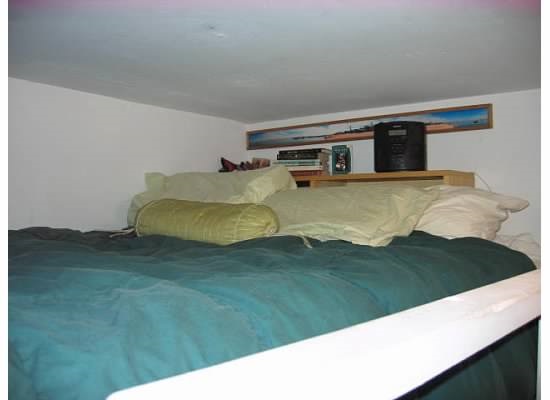
Felice’s loft bed
What was the financial benefit to living this way?
Saved a lot of money. First, the rent was $700. Second, I wasn’t shopping for stuff, because I had nowhere to put it. But during the five years in that space, that experience helped me to see life differently. I never thought, “Oh, once I move I will start buying lots of stuff again.” I realized by having less stuff, I was spending less time cleaning stuff, putting stuff away and working to pay off said stuff. So when the time came to buy a place, I had the money.
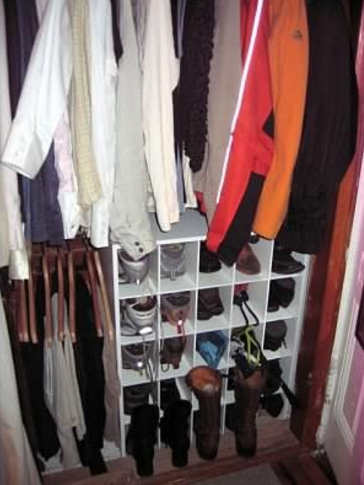 Should NYC continue to encourage micro-apartment development?
Should NYC continue to encourage micro-apartment development?
Absolutely. I have received emails from people around the country and the world, asking where they can find a place like mine. The American motto of living in a big house and shopping for a lot of stuff at Costco’s isn’t for everyone. People come to NYC and other cities, for many reasons – to be actors, singers, writers, make money on Wall Street, etc. They come to follow their dreams and experience life, not necessarily to fill their life with stuff. Some get both.
What made you finally move?
I had been considering moving before the YouTube video went viral. It had been four years at that point. But then from all the media attention, the landlord caught wind of me subletting (honestly, I had no idea I wasn’t allowed, never asked) and I was evicted. At first he said I could stay and he would double the rent, which I was okay with, but then he changed his mind.
You can’t possibly miss that small little apartment, can you? Or does nostalgia creep in?
The day I moved out of the small apartment, I left one or two pieces of art (I only moved two avenues away) and when I went back to get them and to clean the place, I looked around at the empty space and was shocked I had lived there for five years. Suddenly it seemed much smaller than it had that morning when all my stuff was still intact (I packed everything in a few hours as there wasn’t enough room to do so ahead of time). I still walk by the building and look up at the window and it’s not so much nostalgia, but appreciation. That experience changed my outlook on life and what I want out of it, what I am capable of achieving, etc.
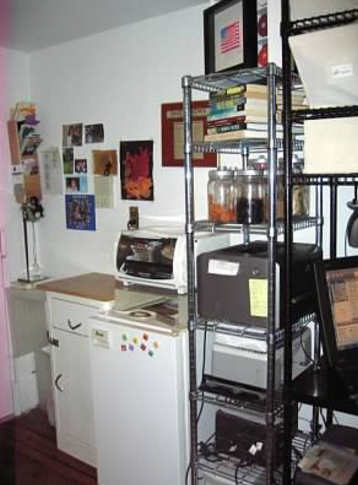
The “kitchen”
What advice do you give apartment seekers in NYC?
Be open-minded. Know your priorities. Be willing to compromise. I have a friend who’s a Realtor who asks her clients right off the bat, “Do you want location or space?” I chose location. And though the space was small, it made my life bigger.
Any permanent habits shaped during the 90-sq ft days that remain?
Many. My philosophy about “stuff” has changed. I would rather spend my money on experiences than things. I no longer dream of one day living in a large home, but rather living somewhere with just the space I need, preferably near a bike path. Oh, and I never sit up too quickly in bed.
What’s your next book?
My next book is “90 Lessons for Living Large in 90 Square Feet (…or more).” It’s a self-help/memoir based on what I learned over the five years I lived in that 90-square-foot studio and how it changed my life. It also touches upon the experiences I had as a professional organizer and other jobs and influences that enabled me to live – and live large – in that tiny space. ’90 lessons’ is more a “want to” guide than a “how to” guide, helping you to learn to live the life you want, in whatever size you chose.
A YouTube video of Cohen’s experience has already garnered more than 10 million views. The video shines light into the unique pad where she lived without a real kitchen and or dining table, but still managed a full and productive life. Her experiment mirrors housing trends in other U.S. cities, where skyrocketing rents have bolstered a shared economy of new housing arrangements and micro-apartments.
Related:
